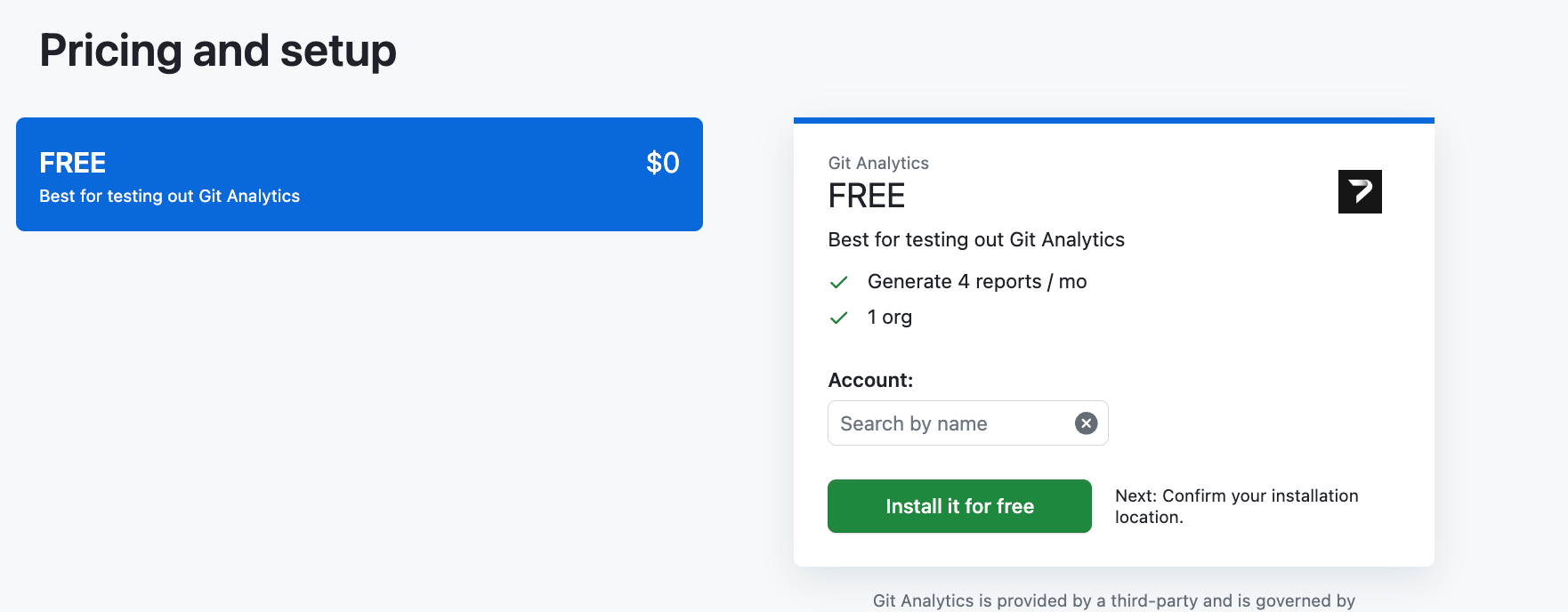Measuring developer productivity has long been considered a black box. It doesn’t have to be that way. - Mckinsey

Salespeople have clear scores: the $$$ they bring in. But for developers, there are no score points. They are often judged by what the manager feels, not by how much they contribute. This disconnect is hurting in two big ways:
- Poor Choices: Big decisions like promotions and layoffs will be based on feelings, not real performance.
- Not Fair: Without objective metrics, developers will be judged based on opinions, not facts. This leads to unfair treatment.
Big tech firms implement systems to prevent these issues. But most startups don’t because setting them up takes too much time and resources.
With advancements in LLMs like GPT4, even small companies can evaluate developers in a cost-effective manner.
Let me walk you through how you can use GitAnalytics to evaluate your developers.
Using Git Data with GPT-4
GitHub does show basic info like lines of code and number of closed issues. But that’s not useful. The volume of GitHub activity doesn’t equal performance.
GitAnalytics is smarter. It uses GPT4 to analyze commit, pull request, and issue data. It then provides a transparent view of individual and team performance.
Here are some examples of what GitAnalytics can do:
- Sum up work: It puts together all the small bits of work to show the complete picture of developers’ work.
- Compare developers' performance.
- Send a weekly email report summarizing all the work done on GitHub.
Quick demo of the weekly email report generated by GitAnalytics. ⬇️
GitAnalytics makes life easier for both developers and managers. Developers save time by getting quick visibility into what they achieved today and what got fixed last week. Managers get clear insights into their team's dev performance.
Startups and dev agencies are already using GitAnalytics to save time.
- Xbase, a fully remote team, automated their team sync meeting with GitAnalytics. Previously, they relied on slack plugins like GeekBot to send them questions such as 'What did you do today?'. The developers would then review their commits and create a report. However, after integrating GitAnalytics, the tool automatically generates daily reports for team members, reducing the time spent on meeting preparations by 90%.
- 2weeksMVP is a development agency that uses GitAnalytics to deliver clients automated reports of their work. These reports replace long manual reporting efforts.
Key Features
- Auto-report: GitAnalytics syncs with your Git repositories to automatically compile reports. 🔄
- Performance Metrics: Get detailed analytics on commits, pull requests, and more. 📊
- Client Dashboard: A sleek dashboard for clients to see real-time updates and reports. 📈
- Team Overview: Keep tabs on individual contributions and team progress. 👥
- Flexible Scheduling: Choose when to send out reports—daily, weekly, or monthly. ⏰
- Secure: Your data stays within your control, always. 🔒
How individuals are using GitAnalytics.
- Developers: Automate compiling updates and focus on coding.
- Managers: Get a 360-degree view of your team's work.
- Agencies: Provide transparent, real-time updates to clients.
- Freelancers: Keep your clients in the loop effortlessly.
Limitations of GitAnalytics ⚠️
- Development Phase: GitAnalytics is in an early stage of development. Some features may be adjusted based on user feedback or removed.
- Performance Evaluation: The tool aids in aggregating and analyzing Git data but does not replace the human touch needed for nuanced performance evaluation and interpretation of reports.
- Data Accuracy: The quality of insights derived is heavily dependent on the consistency and accuracy of data input in Git repositories; errors or inconsistencies can impact the reliability of reports.
- Human Factor: GitAnalytics can only be as effective as the data it is provided with. If developers are not consistent in documenting their commits, the quality and usefulness of the reports generated can be compromised.
- Limited Integration: As of October 21, 2023, GitAnalytics supports only email integration. We're currently adding Slack support. In the coming months, we'll also work on integrating with workspace tools like Trello and Notion.
- Scalability: Larger teams and extensive commit messages can slow down the report generation process, impacting the tool's efficiency for bigger projects.
- Cost Implications: Projects with extensive commits may lead to a considerable consumption of tokens, impacting the cost-effectiveness of larger projects.
Comparison with other Github tools ⚖️
- GitInsights: "Your team's Github contributions delivered to your inbox weekly"
- Swarmia: "Swarmia gives modern engineering organizations the visibility they need to build the right things faster"
- GitView: "Transparent Activity: Get the status of work across your organization all in one view, including code changes, pull requests, and reviews"
- GitClear: "Next-level software developer metrics, powered by a unique code review tool, to help developers self-optimize and foster team collaboration"
- LinearB: "Software Delivery Management for Engineering Leaders to streamline operations, increase predictability, reduce costs, and improve the quality of every release"
- CodeClimate: "Trusted engineering insights for maximum business impact, providing critical context and visibility to improve efficiency, on-time delivery, code quality, and developer retention"
- Pluralsight Flow: "Optimize software delivery and build happier, healthier teams by leveraging workflow data"
- GitKraken: "The world's most powerful suite of Git tools for developers and their teams"
GitAnalytics is the only tool that uses GPT4 to evaluate engineers' performance using Git Data.
GitAnalytics Roadmap 🚀
- Notion and Slack: We're integrating GitAnalytics with Notion and Slack. trello, jira, asana,
- Client Dashboard: We're making a simple dashboard which agencies can use to show their work to their clients.
- Team Stats: You can see how each team member is doing and how the whole team is moving along.
- Your Own KPIs: You can set up your own Key Performance Indicators (KPIs) from GitHub. This lets you focus on what's really important for your team.
- Compare Teams: You will see how quickly other teams complete similar tasks.
50% Lifetime Discount
For the first 200 early adopters, enjoy a 50% lifetime discount. With GitAnalytics Basic, you can generate 30 reports/mo.
(Try our product RISK FREE with with our 7-day no-questions-asked refund policy).
Your Voice Matters
GitAnalytics is currently in its public beta phase. This means that we are constantly refining its features, and we greatly appreciate your feedback, as it will shape the future of the platform. We truly value your suggestions and aim to make remote developer hiring and layoffs more efficient, together.
FAQ
Can I try GitAnalytics for free?
Yes, GitAnalytics offers 4 free reports per month.
Is there a limit to the number of repositories GitAnalytics can handle?
There is no set limit, but performance may vary depending on the number and size of repositories being tracked.
How does GitAnalytics use GPT-4 AI?
GitAnalytics uses GPT-4 to process and analyze the vast amount of data available in Git repositories. It interprets commit messages, code quality, and other essential data to provide a comprehensive performance evaluation of engineers, offering actionable insights and recommendations.
How can GitAnalytics improve engineers' performance?
By providing detailed analytics and insights into engineers' work patterns, strengths, and areas that need improvement. Managers and team leads can use this information to tailor support, training, and development programs, fostering an environment of growth and efficiency.
Can I customize the metrics and analytics provided by GitAnalytics?
This is on our roadmap! You will be able to customize the parameters and metrics to focus on aspects that are particularly relevant to your team and projects, ensuring the analytics are as actionable and relevant as possible.
How do I integrate GitAnalytics with my existing Git repositories?
GitAnalytics is available on the GitHub marketplace. Scroll down to the bottom of the page, and search for orgs or individual accounts you want to add the GitAnalytics app to. And click on ‘Install it for free’.

Where can I get support if I face issues with GitAnalytics?
Reach out to us via email anytime.
Is GitAnalytics suitable for teams of all sizes?
Yes! Whether you are a startup with a small team or a large corporation with hundreds of engineers, GitAnalytics can scale to meet your needs, providing valuable insights to enhance productivity and performance.
Can others see my GitAnalytics data?
No, your GitAnalytics data is private and only accessible to authorized users. We uphold strict privacy protocols to ensure data confidentiality.
Which features will be added to GitAnalytics in the future?
For the latest updates and upcoming features, check out our roadmap page.
How is GitAnalytics different from other code analytics tools?
GitAnalytics is the only tool that uses GPT4 to evaluate engineers' performance using Git Data.
What's the best tool for code analytics and repository tracking?
For a comprehensive comparison and detailed insights, check out this article on the best code analytics tools in 2023.
